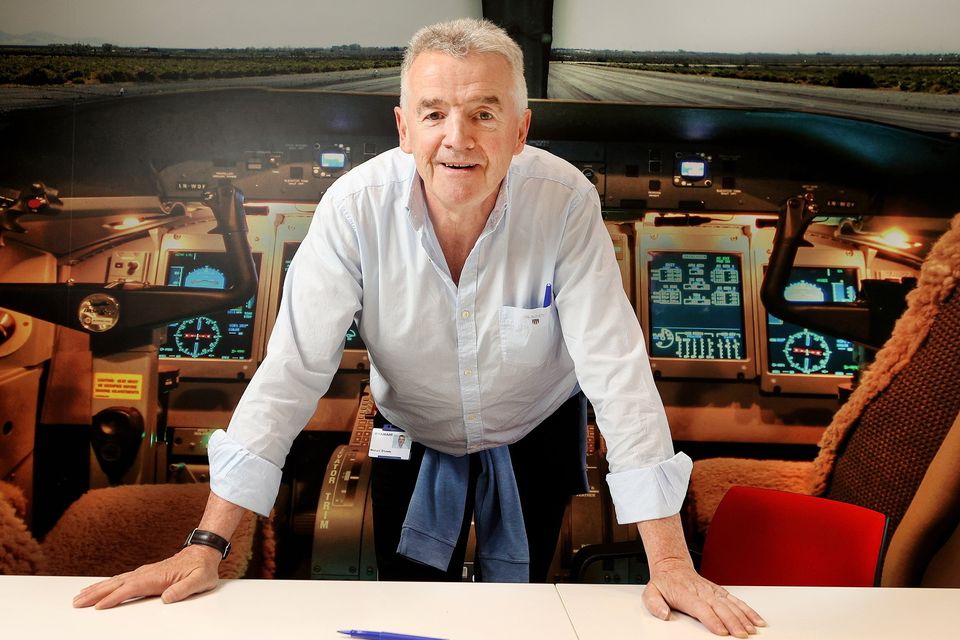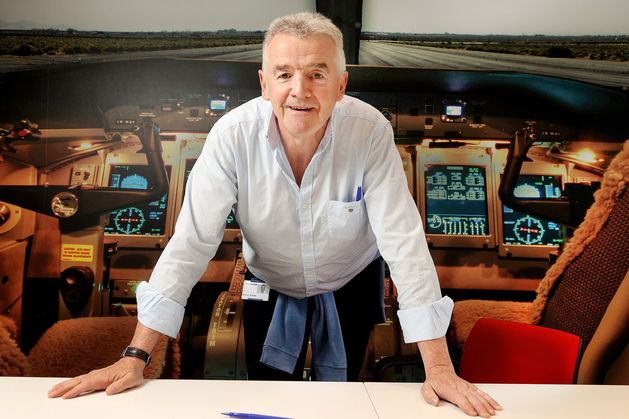Quarterly profits more than doubled thanks to strong Easter demand and as fares surged by more than 20pcO’Leary predicts Donald Trump would ‘chicken out’ of new tariffs on August 1
The airline this weekend finally confirmed it pays staff around €1.50 (£1.30) for intercepting customers who are bringing bags on to the aircraft that are bigger than the allowed size.
It had previously denied there was such a crackdown.
It is reported that the bonus is capped at about €80 for each staff member per month.
Passengers are charged a fee of up to €75 for bringing luggage that is larger than they paid for while booking their journey.
Ryanair currently includes a small carry-on bag – capped at a size of 40x20x25cm and weight of 10kg – with every ticket.
Passengers must pay a fee if they want to bring larger luggage, or if they want to bring multiple bags.
Mr O’Leary said on Monday that summer fares would, on average, be the same rate as 2023 – but added that he expects a boost in profitability for the airline by “controlling costs”.
Members of the European Parliament are pushing for airlines to allow passengers to be allowed to bring on free an on-board personal item and small hand luggage.
However, Mr O’Leary predicted the proposal will not come into law due to a lack of space.
Speaking on RTÉ’s Morning Ireland, he said: “We’re flying largely full flights, about half the passengers can bring two bags and the other half can only bring one – because that’s all that fits in the plane.
“We’re already struggling with that amount of baggage.
“That’s one of the reasons we are so aggressive about eliminating the scourge of passengers with excess baggage.
“One of the things that irritates our passengers most is the one or two people who show up with a rucksack claiming that it fits in the sizer. If it doesn’t fit in the size, it’s not getting on.”
Mr O’Leary said more than 99.9pc of passengers comply with baggage rules, with “sizers” located within the airport.
He said: “We are happy to incentivise our (staff) with a share of those excess baggage fees, which we think will decline over the coming year or two.”
The chief executive added: “It is about €1.50 per bag – and we’re thinking of increasing it, so we eliminate it.”

Michael O’Leary, CEO of Ryanair, at the airline’s HQ in Dublin. Photo: Steve Humphreys
Today’s News in 90 Seconds – July 21st
A Ryanair spokesperson said yesterday that oversized cabin bags “delay boarding and are clearly unfair on the over 99pc of our passengers who comply with our baggage rules”.
“We do pay commission to our agents who identify and charge for oversized bags, but these fees are paid by less than 0.1pc of passengers who don’t comply with our agreed bags rules,” they said.
“Our message to those 0.1pc of passengers is simple: please comply with our generous bag rules or you will be charged at check-in or at the gate. For the 99.9pc of our passengers who comply with our rules, we say thank you and keep flying as you have nothing to worry about.”
The airline recently announced it planned to marginally increase the size of the free personal bag all passengers could bring on board from 40 x 25 x 20cm to 40 x 30 x 20cm. The measurements for a 10kg carry-on, which are included with a priority and two-cabin bag ticket, will remain at 55 x 40 x 20cm.
The confirmation on oversized bag commission comes as the EU has been looking at changes in air passenger rights, with Ryanair among the airlines being examined.
The airline denied claims that it had adopted a stricter policy for carry-on bags following reports earlier this year.
According to Ryanair’s bag policy, if a small or 10kg bag does not fit its sizers at the gate, fees for checking it into the hold range from €36 to €60.
Ryanair revealed that quarterly profits more than doubled thanks to strong Easter demand and as fares surged by more than 20pc.
The Irish headquartered carrier reported profits after tax of €820 million for the three months to the end of June, up from €360 million a year earlier.
Revenues jumped by 20pc to €4.34 billion, boosted by the timing of Easter but also as Ryanair saw fares rise – in particular better-than-expected fares for last-minute bookings.
The average fare rose 21pc year-on-year to €51 in the quarter, it said.
The group is seeing fares rebound after it cut them by 7pc in its previous financial year as under-pressure consumers reined in spending.
But it said passenger growth was still being held back by delays to new aircraft deliveries, up 4% to 55.5 million in its first quarter despite the Easter boost.
It expects a rise of “just 3pc” to 206 million passengers over the full year in spite of strong summer travel demand.
The group has repeatedly slashed its annual passenger forecast, with the last revision in January, blaming aircraft delivery delays from Boeing.
Fares will also not rise by as much in the second quarter, it added.
Mr O’Leary said: “We do, however, cautiously expect to recover almost all of last year’s 7pc full-year fare decline, which should lead to reasonable net profit growth in full year 2025-26.
“The final 2025-26 outcome remains heavily exposed to adverse external developments, including the risk of tariff wars, macro-economic shocks, conflict escalation in the Middle East and Ukraine and European air traffic control strikes, mismanagement and short staffing.”
Meanwhile, Mr O’Leary predicted that US president Donald Trump will “chicken out” of introducing increased tariffs for Europe on August 1.
Asked if he anticipated tariffs applying to Boeing aircraft being delivered to the airline, he said: “Trump will probably chicken out again, I suspect the August 1 will get moved to September or October.
“We have taken delivery of five aircraft in the first quarter but no tariffs applied to those aircraft
“There is a risk of tariffs being introduced by the Europeans or the Americans in some tit-for-tat in August, September or October – but Boeing will have to pay those tariffs.”
Mr O’Leary said Ryanair would work with Boeing to ensure no tariffs are applied to commercial aircraft, which he said would be bad for the manufacturer’s exports to Europe as well as Airbus’s sales to the US – as well as the Irish aircraft leasing industry.
He added: “There’s increasing optimism, though, in Washington that commercial aircraft will be exempt from any tariffs – if Trump ever gets around to actually imposing tariffs.”

